#Early Christian Theology
Text
Seventh-Day Fetishism, Redux
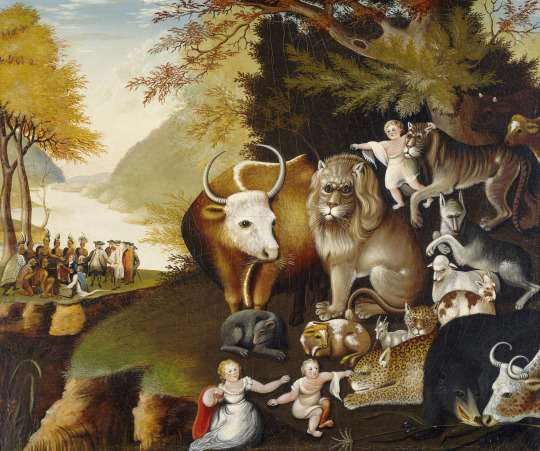
Too many Sabbatarians, I think, miss the reason for the Sabbath. And rather then try to discern the mind of God, and try to divine core principles, they've done what Pharisees throughout history have done - Obey the letter of God's Law without really trying to understand the why of it all.
Recently I received this thoughtful personal message -
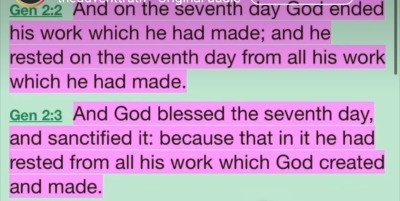
Notice the because - "in it He rested from all His work which God had created and made."
Compare that with the rationale found in the Commandments - "For in six days the LORD made heaven and earth, the sea, and all that in them is, and rested the seventh day: wherefore the LORD blessed the sabbath day, and hallowed it."
Now I used to hate the glib responses to the holiness of the Sabbath as just, "a day off". But essentially, Sabbath and rest become intertwining themes that interpenetrate each other within the Bible. Father Stephen Freeman addresses this in his blog on occasion (1, 2).
And the "rest", as presented, isn't just a glib "rest", but a deeply sacramental Rest. The harvesting and eating of manna becomes ritualized (Exodus 16:20-26), as did the eating of the shewbread by the Priests (Leviticus 24:8-9). The Sabbath represented the covenant between the Israelites and God. Failure to rest on the Sabbath was deemed to be a breach of that covenant, and people who did so were put to death (Exodus 31:14, Numbers 15:32). There were harvest rituals that incorporated the Sabbath (Leviticus 23). But Sabbath became way more than a day -
Leviticus 23:10-11
Speak unto the children of Israel, and say unto them, When ye be come into the land which I give unto you, and shall reap the harvest thereof, then ye shall bring a sheaf of the firstfruits of your harvest unto the priest: And he shall wave the sheaf before the LORD, to be accepted for you: on the morrow after the Sabbath (Sunday) the priest shall wave it.
Leviticus 23:15-16
And ye shall count unto you from the morrow after the sabbath, from the day that ye brought the sheaf of the wave offering; seven sabbaths shall be complete: Even unto the morrow after the seventh sabbath shall ye number fifty days; and ye shall offer a new meat offering unto the LORD. (7 x 7 = 49+1 = Sunday, again.)
Leviticus 23:24
Speak unto the children of Israel, saying, In the seventh month, in the first day of the month, shall ye have a sabbath, a memorial of blowing of trumpets, an holy convocation. (I really do not know if the first day of the seventh month was always "the" Seventh-Day Sabbath, or just "a" sabbath. All I can find in online resources is that it's "New Years" day - which could be called the first day of the year, a sunday... I can also tell you that this "sabbath" doesn't divide easily out of the 207 days of the six months that precede it - even if you do something like 207+1).
Leviticus 23:32
Ninth day of the month from even to even… (9 isn't divisible by 7 or even 7+1.)
Leviticus 23:39
"Fifteenth day of the Seventh month…" (At least 15 is 7 x 2 + 1, Sunday, again.)
Leviticus 25:4
But in the seventh year shall be a sabbath of rest unto the land…" (So, now, every Seventh Year is to be ritualized as part of the Sabbath liturgical rest cycle.)
Leviticus 25:8-11
And thou shalt number seven sabbaths of years unto thee, seven times seven years; and the space of the seven sabbaths of years shall be unto thee forty and nine years. Then shalt thou cause the trumpet of the jubile to sound on the tenth day of the seventh month, in the day of atonement shall ye make the trumpet sound throughout all your land. And ye shall hallow the fiftieth year, and proclaim liberty throughout all the land unto all the inhabitants thereof: it shall be a jubile unto you; and ye shall return every man unto his possession, and ye shall return every man unto his family. A jubile shall that fiftieth year be unto you: ye shall not sow, neither reap that which groweth of itself in it, nor gather the grapes in it of thy vine undressed. For it is the jubile; it shall be holy unto you: ye shall eat the increase thereof out of the field. In the year of this jubile ye shall return every man unto his possession. (Compare this with Leviticus 23:15-16. 7 years x 7 years, plus 1, gives a Sunday Jubilee Sabbath year).
The whole Sabbath cycle is deeply ritualistic, liturgical, a symbol of Rest and of Covenant. I can't help but think that it is based upon a deeply intimate need of human nature. A Pharisaical approach would be to reduce "Sabbath" to a day, and call things done.
I honestly used to think that the whole eighth day rest argument by Sunday keepers was so much hokum - where did that 8th day come from? This blatantly cursory reading though has convinced me that the source of the Eighth Day Rest Cycle literally comes from early Christian reinterpretation of "Sabbath" to the week; in the same pattern as the Sabbatarian Liturgies as outlined in Leviticus 23:10-11, Leviticus 23:15-16, Leviticus 23:39, and Leviticus 25:8-11. I do wish I knew what Leviticus 23:24 and Leviticus 23:32 were all about though.
In the end, I really don't think that a specific day of the week should be a cross for any Christian to die upon. Rather one should use their daily, weekly, monthly, yearly, and even longer worship cycles to delve into the patterns of life, of community, of thanksgiving, and of restoration. The (indefinite article) sabbath is a Rest, a Deep Rest with the creator of the universe and with his creation. If you are limiting, fetishizing yourself to one specific day; establishing lists of do's and don'ts out of some personal idea of rule-keeping around that day, all for an imagined Glory to God - I think your priorities are off, and you are wandering in delusion.
Mark 2:27
And he said unto them, The sabbath was made for man, and not man for the sabbath.
Colossians 2:16
Let no man therefore judge you in meat, or in drink, or in respect of an holy day, or of the new moon, or of the sabbath days.
Glory to God.
May he have mercy upon me.
0 notes
Text
The God-Man: Understanding the Deity and Humanity of Jesus
At a point in time, the eternal Son of God added humanity to Himself, simultaneously becoming God and man, Creator and creature, the unique theanthropic person (John 1:1, 14, 18; 8:58; 10:33; 20:28; Col 2:9; Heb 1:8). Jesus is the God-man and exists in hypostatic union, as a single Person with a divine and human nature (John 1:1, 14; 1 John 4:2-3), both natures being distinct and preserved, not…
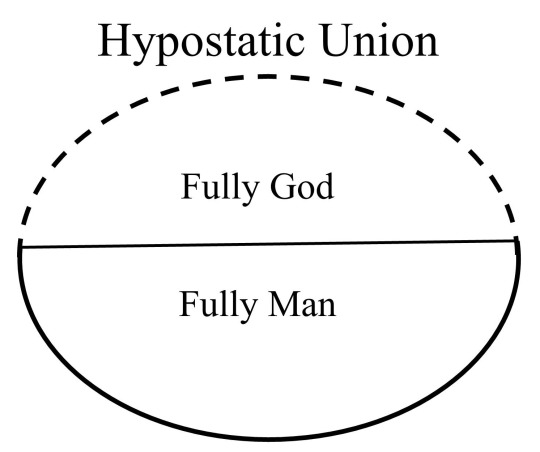
View On WordPress
#Biblical Christology#Biblical Teaching#Biblical theology#Chalcedonian Council#Christian apologetics#Christian doctrine#Christian Faith and Practice#Christian History#Christian Theological Controversies#Christian theology#Christological Understanding#christotokos#Council of Chalcedon#Councils of the Church#Deity of Jesus#Divine Incarnation#Divine nature#Divinity and Humanity#Doctrine of Jesus#Early Christian Theology#Faith and Belief#Human Nature#Humanity of Jesus#hypostatic union#Incarnation#Jesus#Jesus Christ#Jesus is Messiah#Jesus is the Jewish Messiah#Jesus is the Savior
0 notes
Text
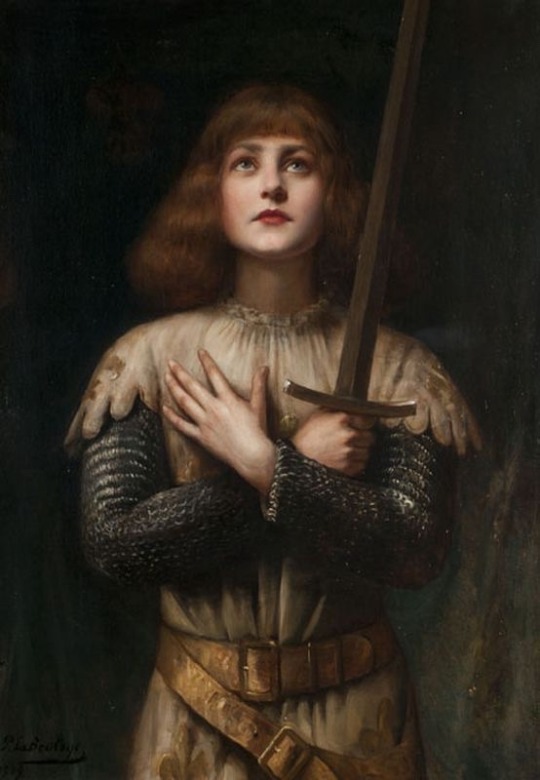
“Go forward bravely, fear nothing. Trust in God; all will be well.”
St. Joan of Arc
#art by Paul Antoine de la Boulaye#1909#early 20th century#christianity#christian#religion#theology#catholic#spirituality#catholicism#christian artist#catholic art#faith#joan of arc#saint joan of arc
239 notes
·
View notes
Photo


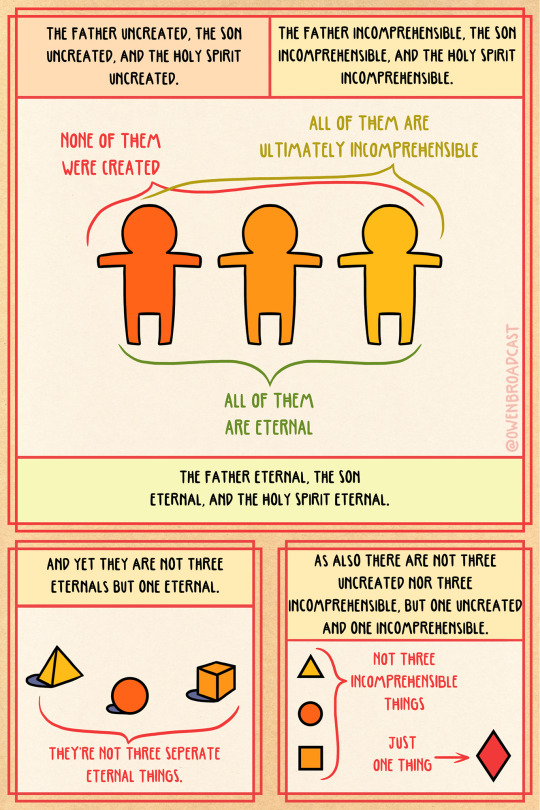






today is trinity sunday.
the athanasian creed, which ive seen dated from the 6th to 9th centuries, is one of the most standard formal descriptions of the trinity.
if youd like to read it for the first time, refresh yourself, or just think about it, i illustrated it here.
129 notes
·
View notes
Text
not to be "I'm not like other girls" about it but it's kinda funny how when I picture a stereotypical "hyperfixation" it's always like, fandom about some book, movie, or tv show when in actuality mine is like, early christian history, theological feuds, and petty catholic drama and I don't even believe in that stuff
#catholicism#early christianity#christianity#theology#look#all I'm saying is#if the pope and his little synod#would just keep fighting the tradcath bishops#we could have the first major schism in centuries#insert “bite each other's dicks off” jpeg#presidential alert the girls are fightingggg
12 notes
·
View notes
Text
athanasius will write a text that solidifies our current understand of jesus's nature as god incarnate and in it he will make the most wild theological assertions you have ever heard
#they're not that weird actually they're just strange...#like i don't know if i agree that jesus didn't get sick because illness is born of sin and jesus never knew sin or whatever#like jesus undeniably experienced some other things that are products of sin. such as i don't know. Dying On A Fucking Cross#i asked my prof about this and he said that it might not hold up now but he enjoys the more 'mystical' element of early christian theology#like that's cool. it's a fun idea. it also Doesn't Make Sense. why does he just Say That.#.txt
3 notes
·
View notes
Text
Today, the Second Day of Christmas, the Church remembers St. Stephen, proto-Deacon and proto-Martyr.
Ora pro nobis.
Stephen (Greek: Στέφανος Stéphanos, meaning "wreath, crown" and by extension "reward, honor", often given as a title rather than as a name, Hebrew: סטפנוס הקדוש), (c. AD 5 – c. AD 34) traditionally venerated as the protomartyr or first martyr of Christianity, was according to the Acts of the Apostles a deacon in the early church at Jerusalem who aroused the enmity of members of various synagogues by his teachings. Accused of blasphemy, at his trial, he made a long speech denouncing the Jewish authorities who were sitting in judgment on him and was then stoned to death. His martyrdom was witnessed by Saul of Tarsus, a Pharisee who would later become a follower of Jesus and known as Paul the Apostle.
The only primary source for information about Stephen is the New Testament book of the Acts of the Apostles. Stephen is mentioned in Acts 6 as one of the Greek-speaking Hellenistic Jews selected to participate in a fairer distribution of welfare to the Greek-speaking widows.
Saint Stephen is first mentioned in Acts of the Apostles as one of seven deacons appointed by the Apostles to distribute food and charitable aid to poorer members of the community in the early church. According to Orthodox belief, he was the eldest and is therefore called "archdeacon". As another deacon, Nicholas of Antioch, is specifically stated to have been a convert to Judaism, it may be assumed that Stephen was born Jewish, but nothing more is known about his previous life. The reason for the appointment of the deacons is stated to have been dissatisfaction among Hellenistic (that is, Greek-influenced and Greek-speaking) Jews that their widows were being slighted in preference to Hebraic ones in the daily distribution of food. Since the name "Stephanos" is Greek, it has been assumed that he was one of these Hellenistic Jews. Stephen is stated to have been full of faith and the Holy Spirit and to have performed miracles among the people.
It seems to have been among synagogues of Hellenistic Jews that he performed his teachings and "signs and wonders" since it is said that he aroused the opposition of the "Synagogue of the Freedmen", and "of the Cyrenians, and of the Alexandrians, and of them that were of Cilicia and Asia" (Acts 6:9). Members of these synagogues had challenged Stephen's teachings, but Stephen had bested them in debate. Furious at this humiliation, they suborned false testimony that Stephen had preached blasphemy against Moses and God. They dragged him to appear before the Sanhedrin, the supreme legal court of Jewish elders, accusing him of preaching against the Temple and the Mosaic Law.[Acts 6:9–14] Stephen is said to have been unperturbed, his face looking like "that of an angel"
In a long speech to the Sanhedrin comprising almost the whole of Acts Chapter 7, Stephen presents his view of the history of Israel. The God of glory, he says, appeared to Abraham in Mesopotamia, thus establishing at the beginning of the speech one of its major themes, that God does not dwell only in one particular building (meaning the Temple). Stephen recounts the stories of the patriarchs in some depth, and goes into even more detail in the case of Moses. God appeared to Moses in the burning bush [Acts 7:30–32], and inspired Moses to lead his people out of Egypt. Nevertheless, the Israelites turned to other gods [Acts 7:39–43]. This establishes the second main theme of Stephen's speech, Israel's disobedience to God. Stephen faced two accusations: that he had declared that Jesus would destroy the Temple in Jerusalem and that he had changed the customs of Moses.
Benedict XVI stated that St. Stephen appealed to the Jewish scriptures to prove how the laws of Moses were not subverted by Jesus but, instead, were being fulfilled. Stephen denounces his listeners as "stiff-necked" people who, just as their ancestors had done, resist the Holy Spirit. "Was there ever a prophet your ancestors did not persecute? They even killed those who predicted the coming of the Righteous One. And now you have betrayed and murdered him."[Acts 7:51–53]
Thus castigated, the account is that the crowd could contain their anger no longer. However, Stephen looked up and cried, "Look! I see heaven open and the Son of Man standing on the right hand of God!" He said that the recently executed Jesus was standing by the side of God. [Acts 7:54] According to Orthodox belief, the "Sanhedrin shouted and covered their ears, and rushed at him. They dragged him out of the city and stoned him, but the holy martyr prayed for his murderers." The people from the crowd, who threw the first stones, laid their coats down so as to be able to do this, at the feet of a "young man named Saul". However, according to the "Aramaic Bible in Plain English" and the "Weymouth New Testament" (Acts 22:20) through , St. Paul, earlier known as Saul admits he was not only standing by, he was holding the garments of those stoning St. Stephen. This has significance. The possible reason for this may be that many of the members of the Sanhedrin were wealthy. (See Luke 18:9-14) Some, who may have been wearing expensive garments may have been hesitant to throw or place them on the ground. Saul's willingness to hold the garments of those stoning Stephen might signify that he considered it an honor to do so at the time. Having held the garments, rather than just watching over them, would have made Saul much more of an accomplice. This could have added greatly to St. Paul's sense of guilt later on and illuminate why he considered himself to be the worst sinner of all. "Here is a trustworthy saying that deserves full acceptance: Christ Jesus came into the world to save sinners--of whom I am the worst." 1 Timothy 1:15 (New International Version) Approving of, and assisting in, the killing of a disciple that Christ himself had chosen, was an unforgettable act, which St. Paul regretted for the rest of his life. "But for that very reason I was shown mercy so that in me, the worst of sinners, Christ Jesus might display his immense patience as an example for those who would believe in him and receive eternal life." 1 Timothy 1:16
Stephen prayed that the Lord would receive his spirit and his killers be forgiven, sank to his knees, and "fell asleep" [Acts 7:58–60]. Saul, a witness to the stoning, "approved of their killing him".[Acts 8:1] In the aftermath of Stephen's death, the remaining disciples fled to distant lands, many to Antioch.
We give you thanks, O Lord of glory, for the example of the first martyr Stephen, who looked up to heaven and prayed for his persecutors to your Son Jesus Christ, who stands at your right hand; where he lives and reigns with you and the Holy Spirit, one God, in glory everlasting. Amen.

#father troy beecham#christianity#jesus#saints#god#salvation#peace#martyrs#faith#early church#theology#new testament#holy trinity#christmas#second temple jewish theology
13 notes
·
View notes
Text
People complain about Christians stealing pagan culture like they forget that the early Christians were in a pagan dominated culture and that the people who were becoming Christians willingly early on were of those cultures.
#I say willingly because it didn't take that long until kingdoms were forcing people to be of Christianity#Just like every other religion ever#Like I'm not saying “the way later Christians used saints as stand ins for pagan gods was 100% natural and shit#Just that Christianity wasn't (and still isn't) a solid ridged set of beliefs and values#and that people will bring often aspects of their previous beliefs with them#Such as Saturnalia morphing into Christmas overtime#Ffs I better not do a theology paper next year and find out everything here is just wrong#Also I'm more speaking about Christianity pre orthodox/catholicism spilt#Before it was the state religion of Rome#Theology#Early Christianity#Please someone correct any misconceptions I gsce#Have#Fuck I hate my keyboard so much on my phone I need to download a better one#But afraid it could be worse#Also I hated myself for saying pagan culture#But like this is more targeted at the people who would only know those preexisting religious beliefs as pagans (and Judaism)#I had a rant about Constantine but had to chillax it to this#It's 3am
2 notes
·
View notes
Text

#feminist#theology#mary magdalene#herstory#feminism#early christianity#religion#spiritualpath#spiritualgrowth#spirituality#she is love
3 notes
·
View notes
Text
The circumcision of the heart
Galatians 5:12
I wish those who are disturbing you might also get themselves castrated!
Do you know why Paul was so mad at people, to the point of wishing they'd get themselves castrated? The Jewish people who came to Christ were acting as a stumbling block to the Gentiles with their requirement to get circumcised. The Gentiles would rather go back to paganism than get themselves circumcised as adults. The Jewish Christians were effectively hindering the gospel by keeping the old ways of the Judaic religion.
What to make of Paul commanding Timothy to get circumcised (Acts 16:3) then? First of all, look at what Paul tells Titus (Galatians 2:3-5) and consider Galatians 5:11-12; Paul was severely against circumcision for the Gentiles. We also know from Acts 15 that Paul argued strongly that it wasn't necessary for Gentile converts to come under the Law of Moses for salvation. Timothy on the other hand, as the son of a Jewish mother (Acts 16:1), would be considered an apostate if he wasn't circumcised, which would hinder their work. Paul didn't command Timothy’s circumcision as a way of salvation or right standing with God; it was merely the fact that having an "apostate" would hinder their work among the Jews. To be used in the synagogues, Timothy had to go through with it. And they were blessed for it (Acts 16:5).
Another good point to remember is that Paul met Timothy soon after the Jerusalem council in Acts 15, while Paul was “[delivering] to [the people] the decrees to keep” (Acts 16:4). To deliver these decrees —which included the command not to circumcise— in the synagogues for the Jews and Gentiles to read, Timothy had to be circumcised. It is ironic, I know.
R.C. Sproul made an excellent observation by pointing to what Christ did with the Pharisees in Mark 7:8 and the difference between how circumcision was viewed at the start of this new faith and how it came to change later on. Sproul wrote, “Jesus took the Pharisees to task for doing it, and Paul did the same thing; that is, in the earlier situation in which circumcision didn’t have this legal import to it, he went with the flow. He said if you want to be circumcised, fine; if you don’t want to, you don’t have to. So for those who wanted it, he did it. But when they tried to make it a law that he must circumcise other people, he steadfastly refused to do it, in order to keep the integrity of the gospel intact.”
In the early days of the church, things were done a certain way and they usually ended up getting out of hand; hence, the apostle Paul had to put his foot down and set people straight — just like he put a stop to the unrestrained giving and donations of early Christians to the church, as well as adding safeguards on how the church should financially help people in need.
You are to have the law written in your heart (Romans 2:15) or have your heart circumcised as Deuteronomy 30:6 tells us. You must seek to have a circumcision of the heart, not the flesh (Romans 2:25-29).
Circumcision saves no one. You are saved by what God has done in the finished work of Christ, not what you have done.
#R.C. Sproul#circumcision#regeneration#apostle Paul#Law of God#Holy Bible#Bible study#Bible notes#Bible verses#Bible quotes#early church#Christianity#faith#religion#church#Law of Moses#Christian quotes#reformed theology#Pharisee#decrees
8 notes
·
View notes
Text
#Jesus Christ Divided#religion#Christianity#history#atheist#theology#early Christianity#New Testament
4 notes
·
View notes
Text
Theological Implications of Jesus' Resurrection for Salvation
Jesus’ resurrection is an essential element in soteriology. In fact, every writer of the NT assumes that Jesus was resurrected from the grave and treat it as an event that took place in time and space. Paul wrote that Jesus “was raised on the third day according to the Scriptures” (1 Cor 15:4), that He was “the first fruits of those who are asleep” (1 Cor 15:20), and that “having been raised from…
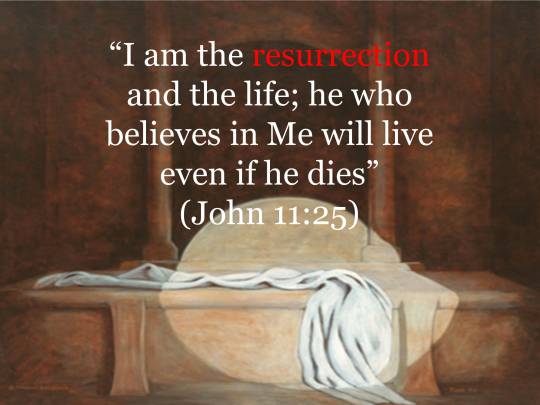
View On WordPress
#Apologetics of Faith#atonement#Biblical Apologetics#Biblical Exegesis#Biblical interpretation#Biblical theology#Biblical Witnesses#Christian apologetics#Christian beliefs#Christian doctrine#Christian faith#Christian Hope#Christian living#Christian salvation#Christian theology#crucifixion#Divine Atonement#Early Christian Beliefs#Easter#Easter Theology#faith#gospel message#Historical Jesus#how important is the resurrection of Jesus#importance of Jesus resurrection#is resurrection important#is the resurrection essential to the gospel#Jesus Christ#Jesus resurrection#justification
11 notes
·
View notes
Text

i feel insane
#its more of a hyperfixation on early-medieval christian theology#and mysticism but that's a lot of words#i wanna post about it but i have other things i need to work on#but. angel/demon ocs#god#.txt
1 note
·
View note
Text
Saturday Worship: A Sabbath Stuck in Time or a Day of Divine Delight?
Early Christian practise saw a dramatic change as it transitioned from Sabbath observance to Lord’s Day observance. This blog examines the historical and theological aspects of this change, offering light on the discussions and interpretations around it.
Background information: The early Christian communities included both Jewish and Gentile believers, necessitating a close investigation of…

View On WordPress
#Brendon Naicker#Bristol church#Christian worship#Churches Unite#controversies#Early Christianity#eschatological significance#historical transition#Jewish and Gentile believers#joburg church#legalism#London City Church#Lord&039;s Day#practical considerations#Sabbath observance#Saturday worship#theological justifications#Theology#Theology School
0 notes
Text
Today, the Church honors St. Matthew, Apostle and Evangelist.
Ora pro nobis.
Matthew the Apostle (also known as Levi) was, according to the Bible, one of the twelve apostles of Jesus and, according to Christian tradition, one of the four Gospel writers (Evangelists). Among the early followers and apostles of Jesus, Matthew is mentioned in Matthew 9:9 and Matthew 10:3 as a publican, or tax collector, who, while sitting at the "receipt of custom" in Capernaum, was called to follow Jesus. He is also listed among the twelve, but without identification of his background, in Mark 3:18, Luke 6:15 and Acts 1:13. In passages parallel to Matthew 9:9, both Mark 2:14 and Luke 5:27 describe Jesus' calling of the tax collector Levi, the son of Alphaeus, but Mark and Luke never explicitly equate this Levi with the Matthew named as one of the twelve.
We do not know much with certainty about Matthew himself beyond what is mentioned in the Scriptures. He was born some time in the 1st c. AD, probably in Galilee, and was the son of Alpheus. As a tax collector he would have had to have been literate in Hebrew Aramaic, Latin, and Greek. His fellow Jews would have despised him, and all tax collectors, for what was seen as collaborating with the Roman occupation force and being therefore a traitor.
According to the Gospel, Matthew was working at a collection booth in Capernaum when Christ came to him and asked, "Follow me." With this simple call, Matthew became a disciple of Christ. After his call, Matthew invited Jesus home for a feast. On seeing this, the Scribes and the Pharisees criticized Jesus for eating with tax collectors and sinners. This prompted Jesus to answer, "I came not to call the righteous, but sinners to repentance." (Mark 2:17, Luke 5:32)
The New Testament records that as a disciple, he followed Jesus, and was one of the witnesses of the Resurrection and the Ascension of Jesus. Afterwards, the disciples withdrew to an upper room (Acts 1:10–14) (traditionally the Cenacle) in Jerusalem to await the outpouring of the Holy Spirit, after which the disciples remained in and about Jerusalem and proclaimed that Jesus was the promised Messiah, and performed many miracles. The Scriptures record that many came to the Faith, including a large number of priests.
In the Babylonian Talmud (Sanhedrin 43a) "Mattai" (a nickname for Matthew in Hebrew Aramaic) is named as one of five disciples of "Jeshu". Later Church fathers such as Irenaeus (Against Heresies 3.1.1) and Clement of Alexandria claim that Matthew preached the Gospel to the Jewish community in Judea, before going to other countries. Ancient writers are not agreed as to what these other countries are. The Roman Catholic Church and the Orthodox Church each hold the tradition that Matthew died as a martyr. The Babylonian Talmud appears to report his execution in Sanhedrin 43a.
According to Church tradition, while preaching in Ethiopia, Matthew converted, and then consecrated to God, Ephigenia of Ethiopia, the virgin daughter of the Aethiopian King Egippus. When King Hirtacus succeeded Egippus, he asked the apostle if he could persuade Ephigenia, his neice, to marry him. Matthew thus invited King Hirtacus to a worship service the following Sunday where he rebuked the king for lusting after the girl, as had consecrated herself to God and therefore was the bride of Christ. The enraged King ordered his bodyguard to kill Matthew who stood at the altar, making him a martyr.
Early Church tradition holds that the Gospel of Matthew was written by the apostle Matthew, sometime between AD 40-51. This tradition is first attested, among the extant writings of the first and second centuries, with the early Christian bishop Papias of Hierapolis (c. AD 60–163), who is cited by the Church historian Eusebius (AD 260–340), as follows:
"Matthew collected the sayings of or about Jesus in the Hebrew Aramaic language, and each one interpreted them as best he could." Likewise, early Christian theologian Origen (c. 184–c. 253) indicates that the first gospel was written by Matthew, and that his gospel was composed in Hebrew Aramaic near Jerusalem for Hebrew Christians, which he then translated it into Greek. The Hebrew Aramaic original was kept at the Library of Caesarea. Sometime in the late fourth or early fifth century, the Nazarene Community transcribed a copy for Jerome, which he used in his work. This Gospel was called the Gospel according to the Hebrews or sometimes the Gospel of the Apostles, and it was once believed that it was the original to the 'Greek Matthew' found in the Bible.
We thank you, heavenly Father, for the witness of your apostle and evangelist Matthew to the Gospel of your Son our Savior, Jesus; and we pray that, after his example, we may with ready wills and hearts obey the calling of our Lord to follow him; through the same Jesus Christ our Lord, who lives and reigns with you and the Holy Spirit, one God, now and forever.
Amen.
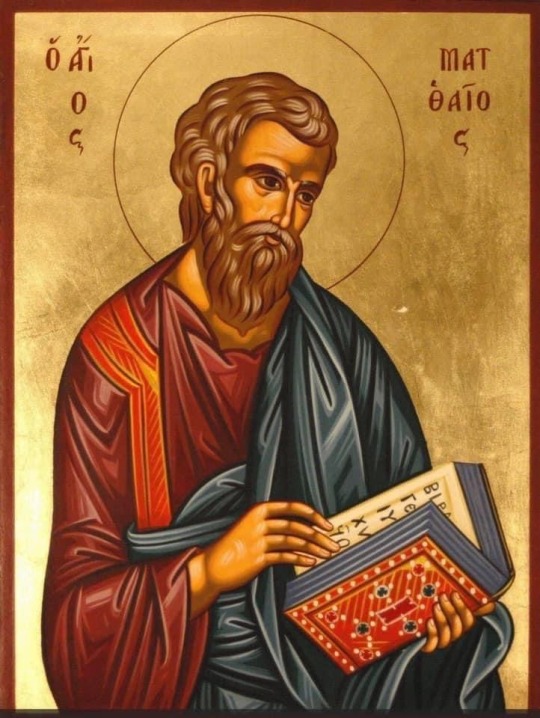
#father troy beecham#christianity#jesus#god#saints#salvation#peace#martyrs#faith#early church#new testament#second temple Judaism#second temple jewish theology#evangelist#Gospel
4 notes
·
View notes
Text
The following post came directly from the FFWPU and their research. That said, there’s a lot of interesting information on the formal connections between the early Unification Church and western Pentecostalism. The Apostolic Church International was known to have been affected by the William Branham-associated “Latter Rain Revival,” where a number of doctrines were pushed, including the British Israelism-influenced “serpent seed” doctrine (which claims the fall of Adam and Eve was sexual, and was also racialized). The early practices of the Unification Church were also much more openly pentecostal, with tongues and interpretation, prophecy, etc.
A Man with a Mission – Part 3
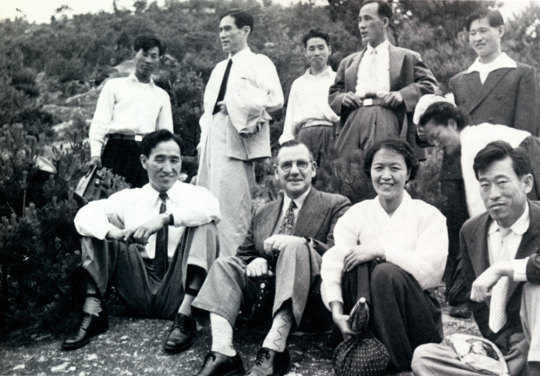
▲ Pictured: Pastor Joshua McCabe (seated, center) with True Father (left) and Young Oon Kim. Behind ar Church President Hyo Won Eu (light-colored suit) and Hyo Min Eu (hands on his belt), among others; Pastor McCabe recorded his impressions of Father and the early church in an article that was published in his own church’s magazine, and reproduced here.
In 1954, the year our church was formally registered in Seoul, David S. C. Kim traveled to Britain to study on a UN scholarship at the age of 38. Even though True Father did not personally assign him to do so at that time, David Kim took every opportunity to reach out to other churches and witness to the truth. The following account records a remarkable and little-known result of that investment. (click here if you wish to read Part 1 or Part 2)
David Sang Chul Kim’s Testimony:
Not long after the founding of HSA-UWC in Korea, I was selected by the Korean government to study in Britain for two years as a UN scholar, along with other under-developed nations’ representatives at Swansea College, University of Wales. Externally I was a UN scholar, but internally I had a mission to spread True Father’s message to Christians overseas and around the world.
While I was in Wales I never neglected my heavenly mission and duty. Whenever I had spare time, I visited many churches and small groups to look for people, and spoke many times at churches as a guest speaker. On those occasions I would introduce our Korean group and preach based on the contents of Divine Principle, which was available only as handwritten notes exchanged among the early members. Near the end of my stay in England, I succeeded in contacting a conservative Christian organization called the Apostolic Church International, which was holding a World Convention in South Wales at that time. I was allowed to speak for 30 minutes, appealing to 3,000 participants at the World Convention about the situation of Teacher Sun Myung Moon, our movement and the Korean government persecution.
In 1956, the Apostolic Church International’s Australian mission headquarters sent one Pastor Joshua McCabe to our group in Seoul, Korea. He studied the Principle for eighty days and helped with Professor Young Oon Kim’s English translation of Divine Principle. Seven hundred copies were completed and distributed throughout the world even before the Korean edition was published. Mrs. Won Pok Choi, Miss Young Oon Kim and I, as a trinity, worked together to teach the depth of Divine Principle and take care of Pastor McCabe as a special guest of the church.
From our own research into Pastor McCabe:
One day, after speaking to a group at a Baptist church in a small town thirty kilometers from Swansea, a couple who attended the Apostolic Church (a Pentecostal denomination) met and befriended David Kim. This led to his appearance at their annual church convention. In a letter to his flock that was read out in churches a few weeks later, then president of the Apostolic Church, Hugh Dawson, mentioned “a Korean brother by the name of Sang-chul Kim,” whom he said, “made a strong appeal to us in the Convention to send a missionary to his land.”
In June 1956, the Apostolic Church dispatched Pastor Joshua McCabe in response to David Kim’s expressions of affinity between our church and theirs. McCabe was a Scotsman who had been sent by his church to Australia in 1932. He had been at the convention in Wales and remembered that while there David Kim had “received the Gift of the Holy Spirit.” Pastor McCabe flew from Melbourne and arrived in Seoul, a city that “still had lots of buildings reduced to rubble.” He stayed for nearly eighty days, lodging in the home of a member. He interacted with the English- speaking members, especially David Kim (1915-2011), Choi Won-pok (1916–2006) and Kim Young-oon (1915–1989). And he met and conversed with True Father. It has to be said that over time, Pastor McCabe found that our beliefs did not coincide with those of the Apostolic Church – though there were interesting parallels. For example, the Apostolic Church had a strong tradition of revelation plus a firm belied in the reality of Satan. Pastor McCabe returned to Australia with an early English translation of at least some of what would later be published as an early version of Divine Principle. However, it appears that no further contact between the Apostolic Church organization and our church ensued.
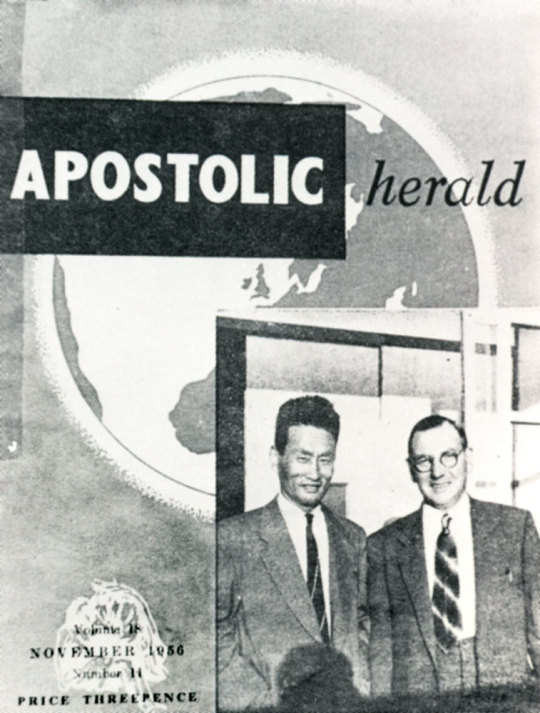
▲ Pictured: The cover of the November 1956 edition of the Apostolic Herald in which Pastor McCabe’s testimony appeared, which pictures David S. C. Kim with Pastor McCabe
Although Pastor McCabe’s later letters indicate slightly more jaded memories of his experience, he was certainly the first foreign observer of our church, and he witnessed the early, spirit-filled services that we have heard testimony of by our own elders.
The following is the major portion of the article Pastor McCabe wrote for the Apostolic Church’s own magazine some two and a half weeks after his arrival in Korea in 1956 (printed some months later):
From the Apostolic Church’s magazine Apostolic Herald, November 1956 Edition
Many of you will remember meeting Mr. Sang Chul Kim, who studied at Swansea University as a United Nations student and attended the Ammanford1 Assembly of the Church, later coming to the Penygroes Convention in August 1955.2 He sent an invitation for a representative of the Church to go and visit the group of Christians to whom he was attached and the invitation was passed on to the Australian Missionary Advisory Board. At our Quadrennial Council at Easter I was chosen to make the journey of 8,000 miles from Headquarters in Melbourne, Australia, to Seoul in Korea. I arrived here on June 22nd after three days’ journey by air…
On the following Tuesday I was warmly welcomed at a representative party, when leaders of the group, Mr. Moon and Mr. Yoo [Church president Rev. Hyo Won Eu], together with others arranged a Korean welcome and meal in honor of their Western visitor. Among the members who attended were two college professors, two doctors of medicine and lecturers, an ex-Minister of Labor, a colonel of the Korean Air Force, and a number of businessmen who are all members of the group. Speeches of welcome from various members were delivered, and Mr. Kim made the speech of the evening in English. Others welcomed me in Korean, and I spoke on behalf of the Apostolic Church in the Motherland and Australia. The group of Christians to whom I have come are not Pentecostal or Apostolic as we know it, and yet the Spirit of the Lord is manifest among them, as some have visions, others have tongues and interpretations, while a spirit of prophecy is exercised by others in private….
The fervor and sincerity of the worship, the soul stirring preaching of Mr. Moon, a born orator who stirs his congregation to response both in praying and preaching is wonderful. Almost without exception the members are there because they longed for something deeper.… To this hall come between 300 and 400 people. There are no seats as in other churches; everyone sits on the floor. Half an hour before the service is due to begin we have a time of singing, and the place is packed. Many parts of Seoul are bomb damaged and there is not sufficient money to repair the city. The result is that accommodation is at a premium, and the group here is glad to have their hall.
It is a hive of spiritual activity. Mr. Yoo, the lecturer, gives lectures on the “Principles,” as they term their beliefs, for four to five hours a day. He covers their doctrine in two lectures, and this he does three times a week to enquirers who number as many as thirty to forty, and sometimes as few as five or six. At the end of each half year an examination is held. One hundred and thirteen from four different centers sat the examination on Sunday, 1st July. Of these twenty-eight passed with 80% or more marks. Seventeen diplomas and eleven certificates were presented to successful students who ranged from High School students to older people about fifty years of age, and including a professor from a college and a medical doctor. This week a lady doctor and a congressman attended the lectures. There are eight centers stretching over the three hundred miles from Seoul to Busan in the south, and the total membership is variously quoted at 600 to 1,200. There are always about 300 at the Seoul service on Wednesday and between 300 and 400 on Sundays.
Their doctrines are divergent from ours on several points. I am studying their principles, and though I have been here for eighteen days I have only given one address, due to having met with a slight accident when returning from the welcome party. I have now recovered and hope to give other talks on our teaching. One thing is evident—the condition for salvation is receiving Christ through faith in Him. Satan is a real foe who has to be fought and overcome. They do not baptize in water or break bread on the Lord’s Day as we do. I solicit prayers of all your readers and the Apostolic friends in Great Britain that the Lord’s purpose may be wrought out between our groups in Australia, Great Britain and Korea. The people here are very kind and gracious and the personal stories of how they were led to come to the church are wonderful. Like the Apostolic Church in Great Britain they are sacrificing to make the building of a meeting place possible. There are difficulties, but God specializes in the impossible, so remember to pray.
https://familyfedihq.org/2017/06/a-man-with-a-mission-part-3/
#joshua mccabe#christianity#early unification church#early church#unification church history#unification church in korea#unification church in the republic of korea#pentecostalism#apostolic church internationalism#latter-rain revival#david kim#young oon kim#theology#history#church history#Sang Chul Kim#Hyo Won Eu#william branham#pastor mccabe
0 notes